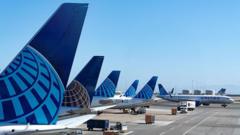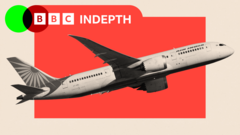The Trump administration has initiated a significant investigation regarding the importation of commercial aircraft, jet engines, and associated components that could result in new tariffs, reflecting ongoing concerns about national security and domestic manufacturing. This inquiry was prompted by Commerce Secretary Howard Lutnick under the Trade Expansion Act on May 1, highlighting a strategy focused on protecting local industries.
Over the years, President Trump has wielded this authority to impose tariffs on various sectors, including aluminum and steel, further plunging into disputes over semiconductors and pharmaceuticals. The inquiry will gather feedback from industry stakeholders about the current demand for aircraft and engine manufacturing, the reliance on foreign suppliers, and the extent of governmental support they receive in their home countries.
Experts express concerns over the impact such tariffs could have on the aerospace sector, which has historically enjoyed robust trade surpluses—exporting approximately $125 billion this year, an economy driver second only to oil and gas. Eric Fanning, president of the Aerospace Industries Association, expressed optimism about collaborating with the Commerce Department to enhance domestic supply chains while ensuring international trade relationships that have cultivated the U.S.'s prominence in aerospace manufacturing.
Although Boeing, a prominent commercial airplane manufacturer, reported that previous tariffs had minor immediate effects, concerns persist regarding potential ripple effects on its suppliers. The company currently faces 10 percent tariffs on parts sourced from Japan and Italy. Similarly, RTX, a manufacturer of plane engines, anticipates a staggering $850 million in tariff costs, while GE Aerospace foresees a $500 million financial burden this year due to the potential tariff modifications.
Historically, nations have leveraged tariffs and subsidies to bolster their aviation industries, resulting in heightened tensions between the U.S. and Europe over subsidy claims involving leading manufacturers Boeing and Airbus. Following a protracted dispute ending in 2021, both regions had decided to focus collaboratively on countering China's growing industrial influence.
The outcome of this investigation could have far-reaching implications for international trade practices within the aerospace sector and beyond as the U.S. attempts to safeguard its domestic industries against foreign competition.






















